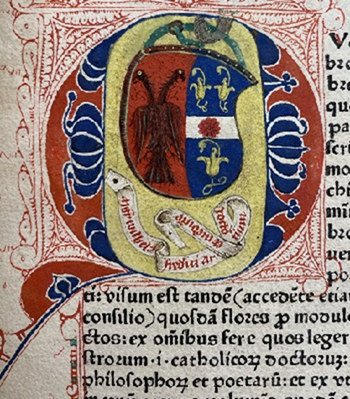
What makes a text captivating? How do you recognize repetitions, inconsistencies, faulty logic and other problems with writing? What does it take to guide a text from writer to reader? How do you write for a range of different audiences?
The core of the programme provides a solid grounding in the practical and theoretical skills required for editing, translating and writing in a professional context. Students will also have the opportunity to learn about manuscript studies, the history of the book and digital publishing.
| Semesters | ||||
|---|---|---|---|---|
| CoursesCourse Catalog > | 1a | 1b | 2a | 2b |
WEM 1: Literature, Society, and Mediation (10 EC, optional)
You can find all items and detailed course descriptions on Ocasys (make sure to select the correct year at the top right). | ||||
WEM 2: From Manuscript to Printed Book (10 EC, optional)
You can find all items and detailed course descriptions on Ocasys (make sure to select the correct year at the top right). | ||||
WEM 3: From Printed Book to Digital Text (10 EC, optional)
You can find all items and detailed course descriptions on Ocasys (make sure to select the correct year at the top right). | ||||
WEM 4: Advanced Skills in Editing (10 EC, optional)
You can find all items and detailed course descriptions on Ocasys (make sure to select the correct year at the top right). | ||||
| MA Thesis (20 EC) | ||||
WEM 5: Translating and Editing for Publication (10 EC, optional)
You can find all items and detailed course descriptions on Ocasys (make sure to select the correct year at the top right). | ||||
As part of the programme, students can opt to complete a 10-credit work placement (an internship). Our graduates have often gone on to work at the same institutions at which they undertook their internships. At the Faculty of Arts, students are responsible for finding a placement for themselves and having it approved by the placement coordinator for their programme.
| Programme options |
|---|
| Master's placement (specialization) This Master's track includes an optional work placement for which you are awarded ECTS credit points. It is your responsibility to find a placement yourself, but the Mobility Office can offer help with this where necessary. |
| Specific requirements | More information |
|---|---|
| previous education |
Students with a Bachelor's degree in English Language and/or Literature or in another literature or culture area taught in English (e.g. American Studies) showing at least 60 ECTS or equivalent in literary studies (literary analysis, literary theory, genres, periods) are admissible to this Master's track. |
| language test |
Additional English language requirement: a TOEFL iBT with a score of 110 (min. of 25 on all items); an IELTS, Academic Module, with a score of 8 (min. of 7.5 on all items); ERK level C1 or Cambridge C1 Advanced (level A) or C2 Proficiency with a minimum score of 200. If your BA does not certify this, you may have to take an appropriate language test. |
| other admission requirements |
To assess whether your educational/academic background meets the specific programme requirements, we will consider the level and curriculum of your previous studies. This evaluation is carried out by our Admissions Office and the Admissions Board. |
| Study programme | Organization | Transition |
|---|---|---|
| English Language and Culture | University of Groningen | No additional requirements |
| Study programme | Organization | Transition |
|---|---|---|
| Engelse Taal en Cultuur | All Research universities | No additional requirements |
| Type of student | Deadline | Start course |
|---|---|---|
| Dutch students | 15 August 2025 | 01 September 2025 |
| 15 August 2026 | 01 September 2026 | |
| EU/EEA students | 01 May 2026 | 01 September 2026 |
| non-EU/EEA students | 01 May 2026 | 01 September 2026 |
| Specific requirements | More information |
|---|---|
| previous education |
Students with a Bachelor's degree in English Language and/or Literature or in another literature or culture area taught in English (e.g. American Studies) showing at least 60 ECTS or equivalent in literary studies (literary analysis, literary theory, genres, periods) are admissible to this Master's track. |
| language test |
Additional English language requirement: a TOEFL iBT with a score of 110 (min. of 25 on all items); an IELTS, Academic Module, with a score of 8 (min. of 7.5 on all items); ERK level C1 or Cambridge C1 Advanced (level A) or C2 Proficiency with a minimum score of 200. If your BA does not certify this, you may have to take an appropriate language test. |
| other admission requirements |
To assess whether your educational/academic background meets the specific programme requirements, we will consider the level and curriculum of your previous studies. This evaluation is carried out by our Admissions Office and the Admissions Board. Students with an international diploma should fill in the checklist. This checklist needs to be uploaded via the Progress Portal when applying for this programme. |
| Type of student | Deadline | Start course |
|---|---|---|
| Dutch students | 15 August 2025 | 01 September 2025 |
| 15 August 2026 | 01 September 2026 | |
| EU/EEA students | 01 May 2026 | 01 September 2026 |
| non-EU/EEA students | 01 May 2026 | 01 September 2026 |
After graduating from the MA Writing, Editing and Mediating programme, you will be equipped with academic and professional skills that will prepare you for further study at PhD level and for the job market. You will have developed the ability to:


Hi! I'm Alexandra Versluijs, 24 years old, and a final-year student of the MA in Writing, Editing and Mediating and the Research MA in Classical, Medieval and Early Modern Studies. I specialise in Old English language and literature and have developed a passion for all things editing. During my time in Groningen, I have been a member of NUTS, TJAS and Bernlef.

Hiya :) My name is Sandra, I'm twenty-five years old, and I am a recent graduate of the MA Writing, Editing, and Mediating programme. I am currently working as a freelance writer, specialising in copy and proposal writing.
